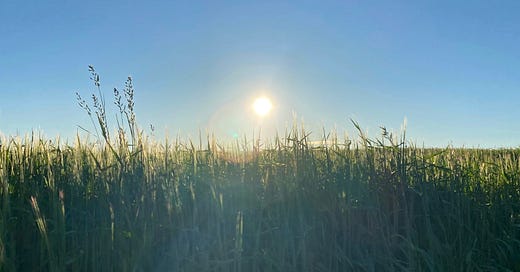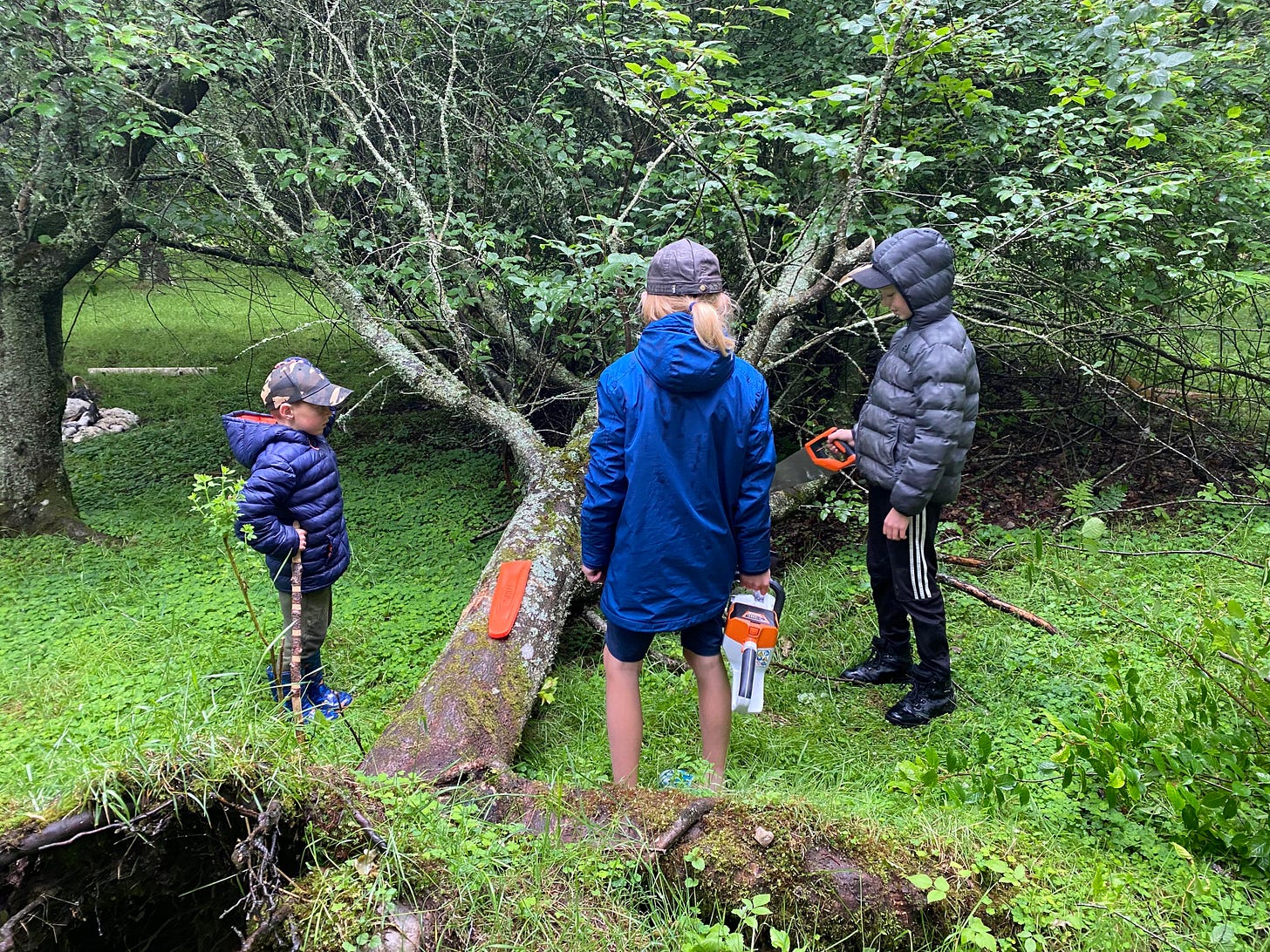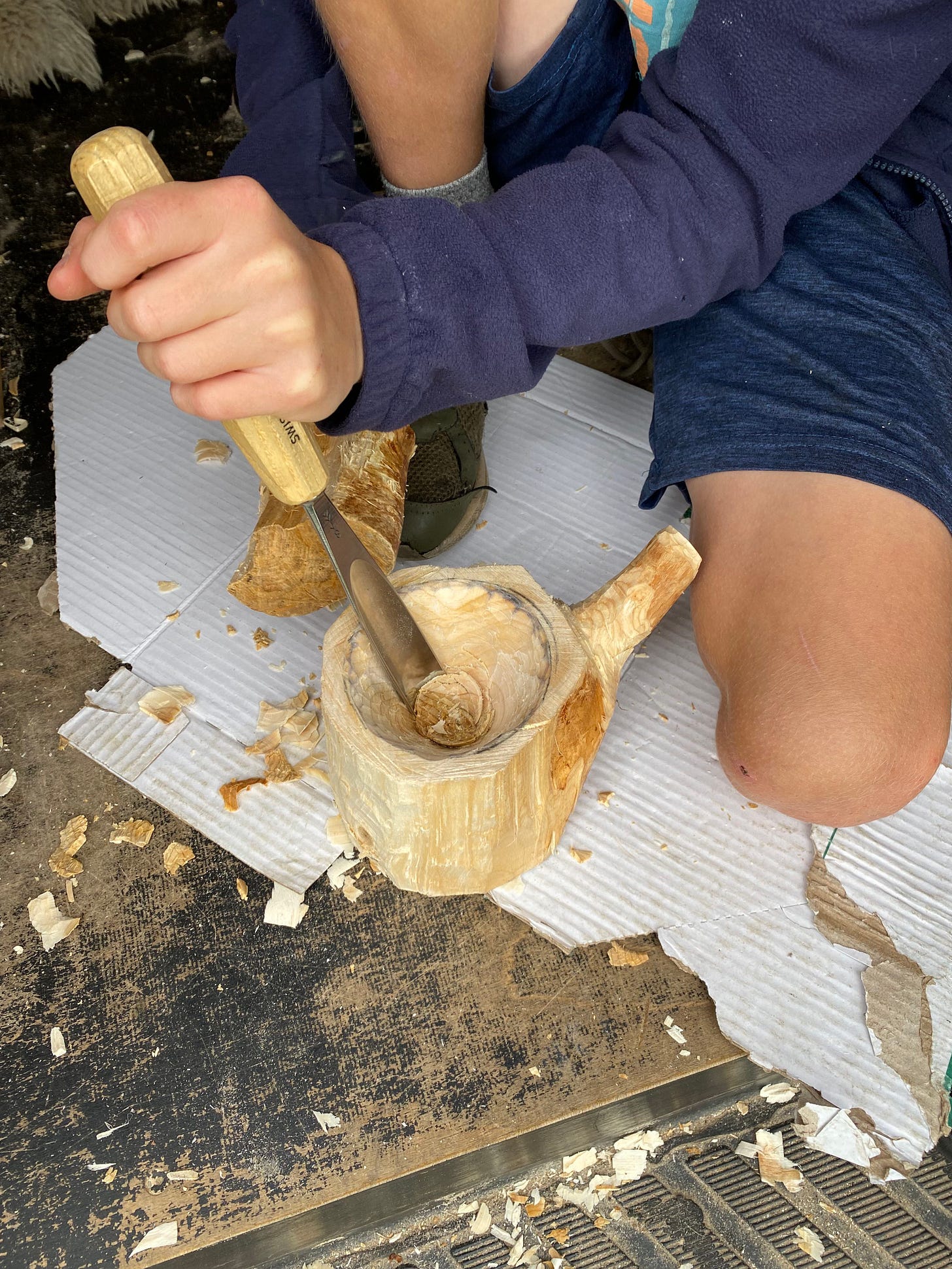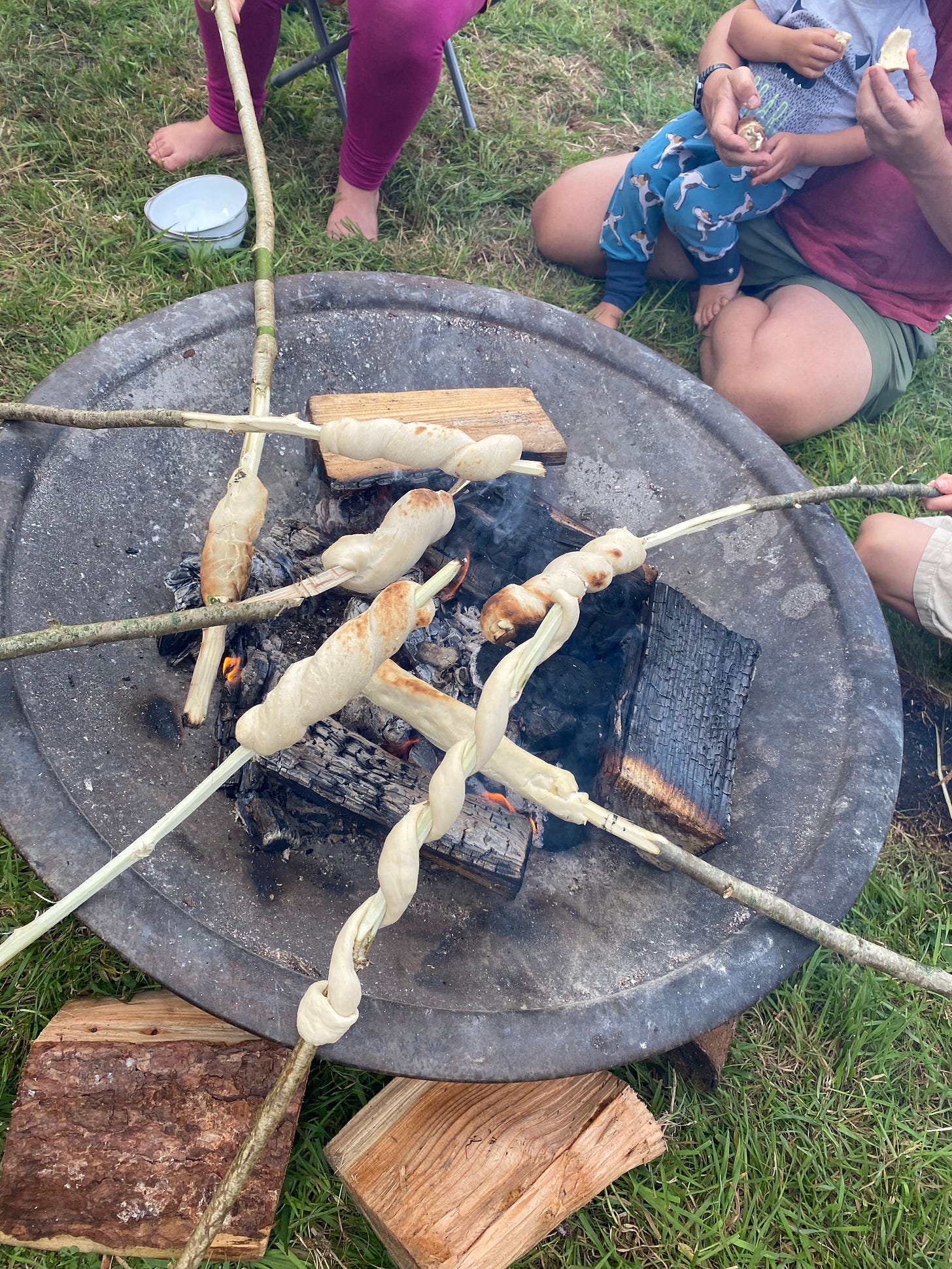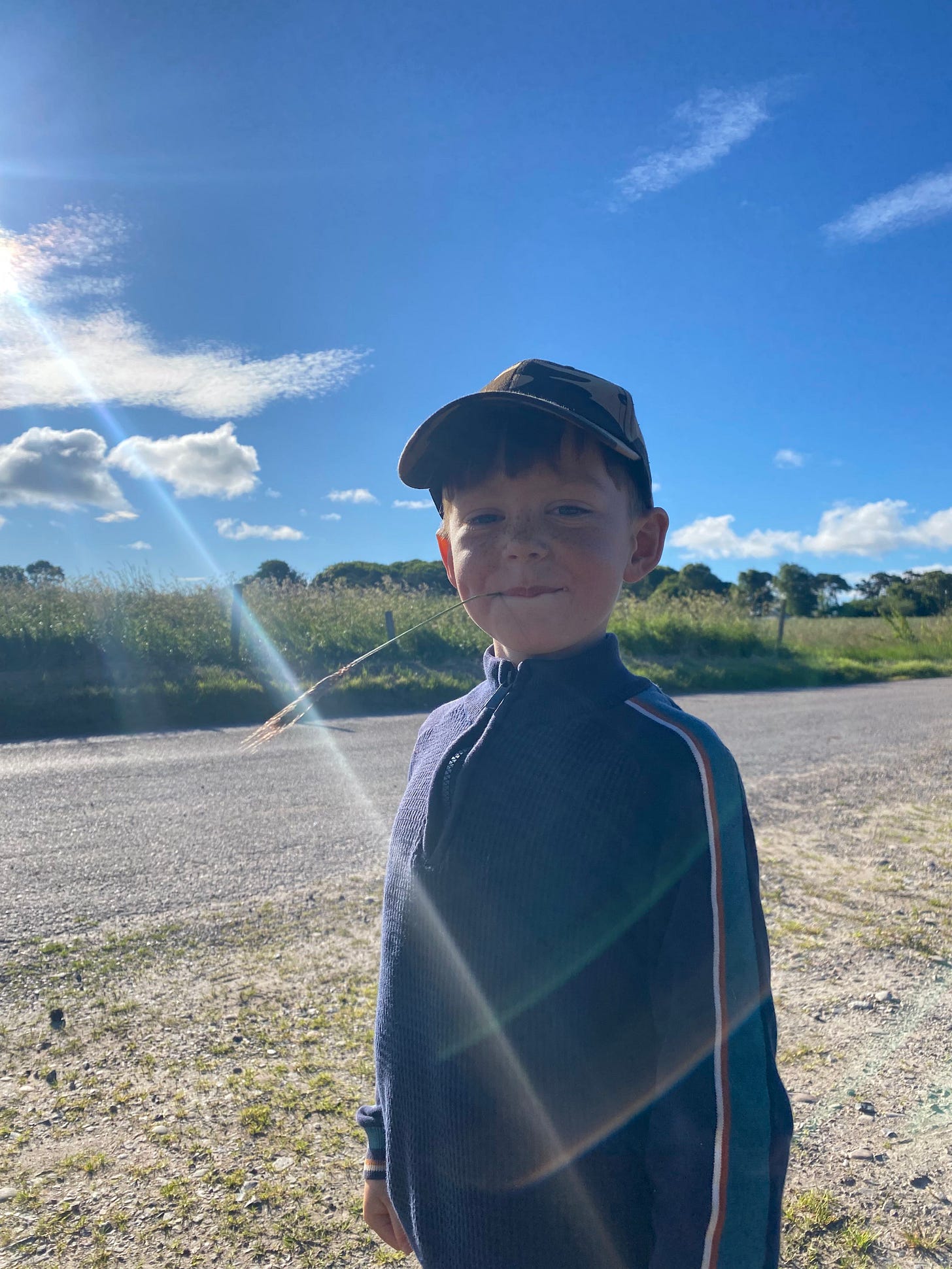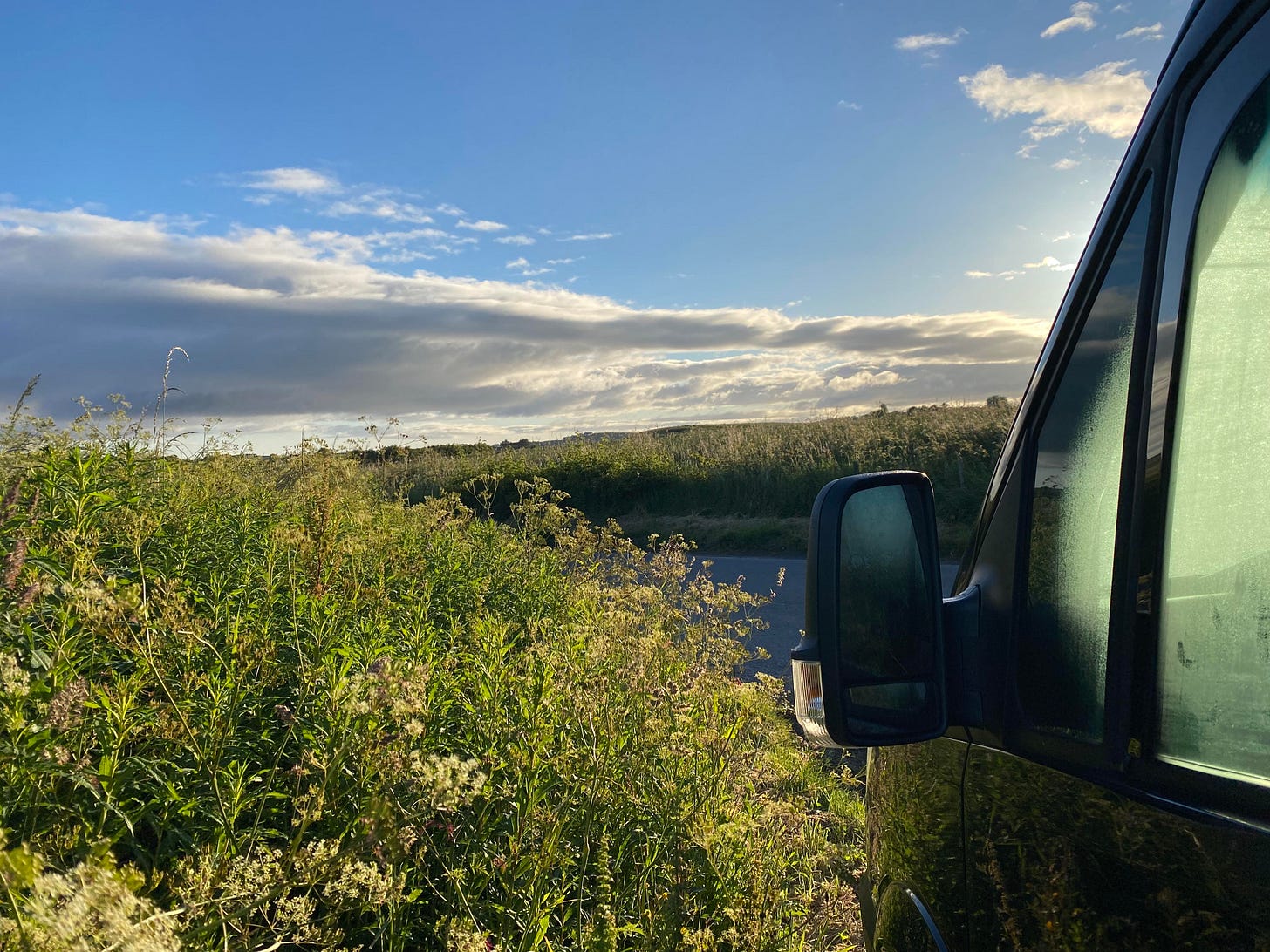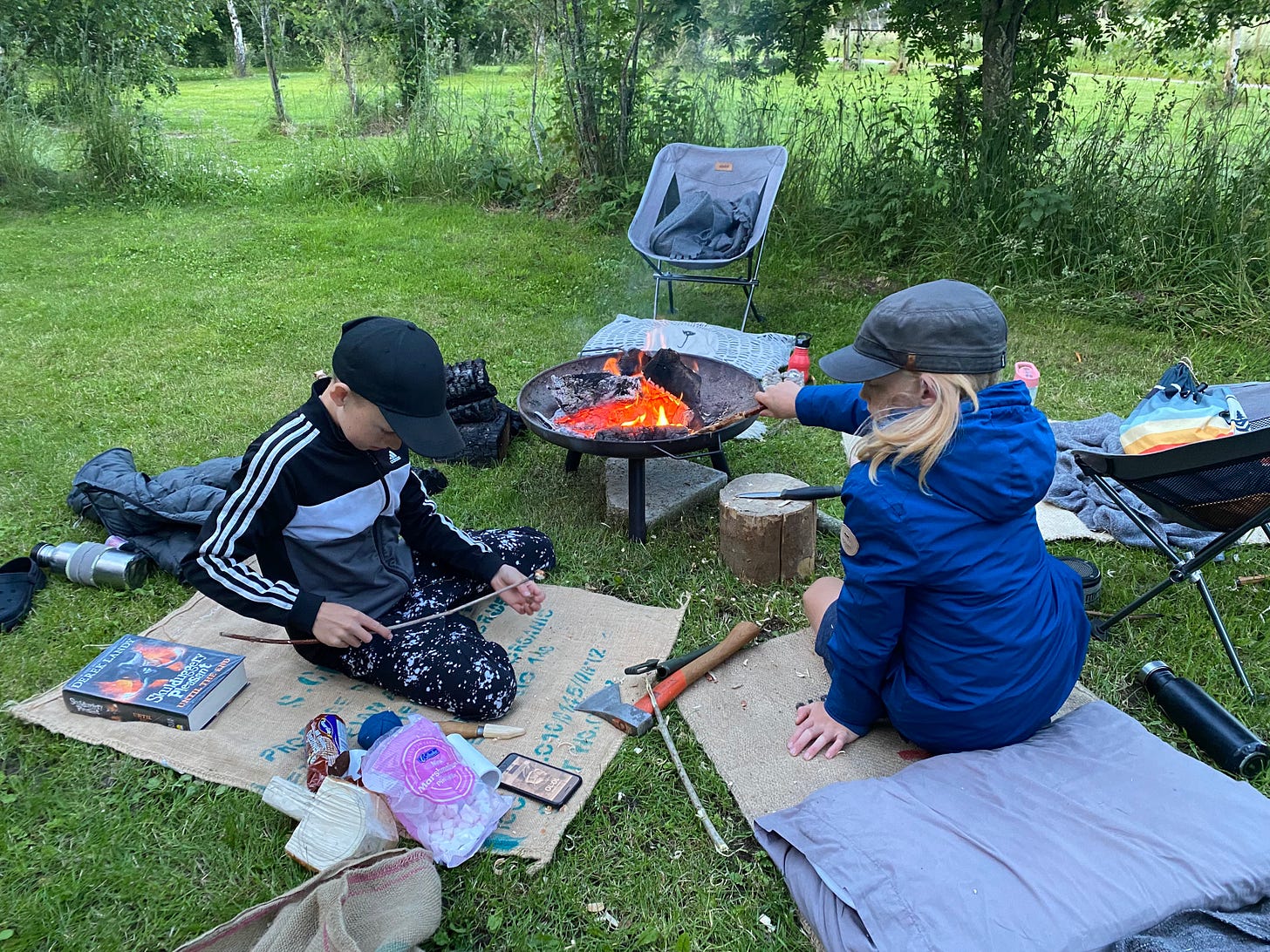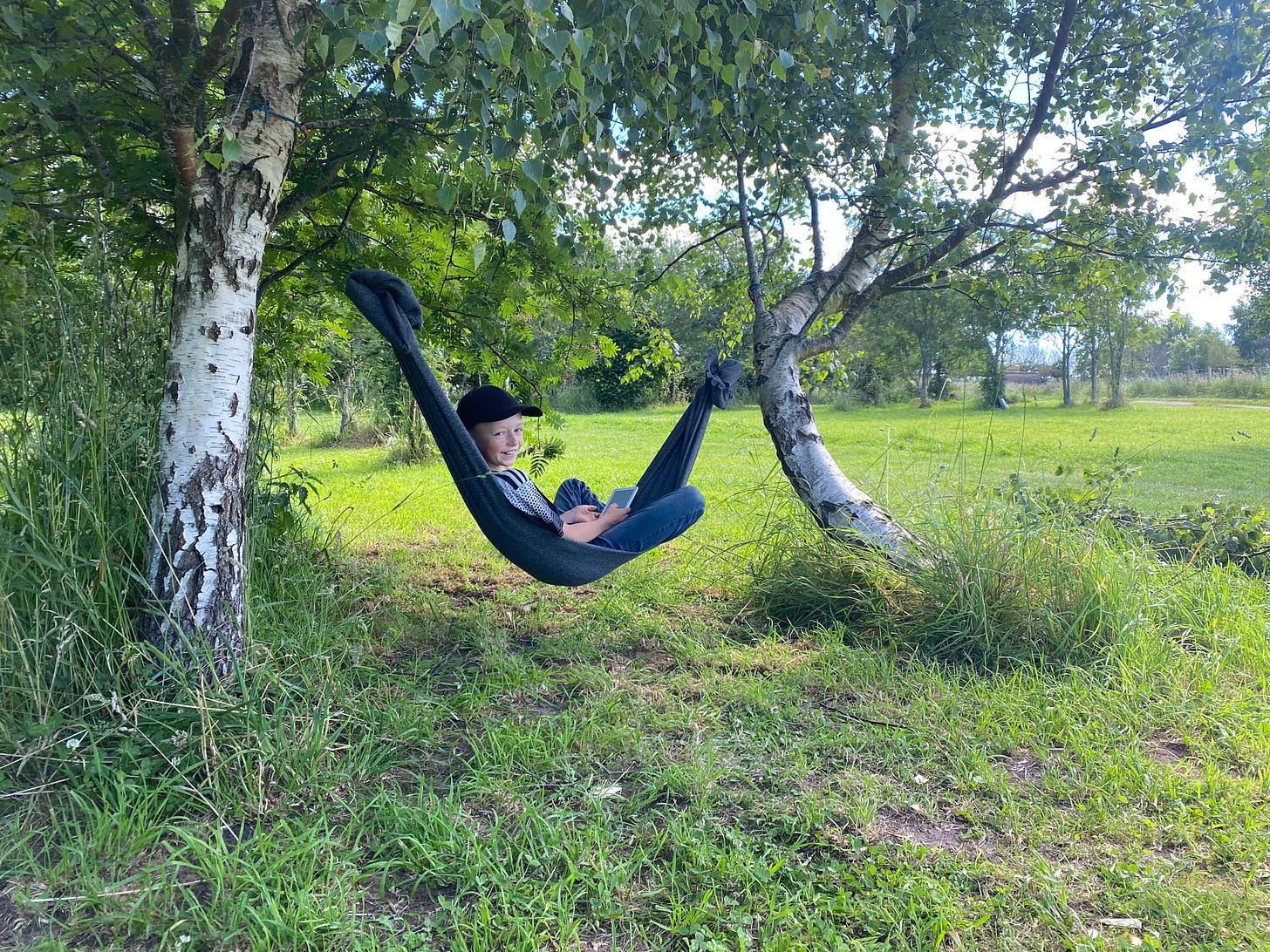A monthly feature giving you a week-long snapshot into our nomadic family life.
Monday 17th June
Achneim Wood, Cawdor Estate, Scotland
The foraging party has found what it is looking for: a fallen tree lying in a copse.
I am with Thor and North.
We are walking through a wet Moray woodland on a damp grey day when we make the discovery: a bird-cherry sprawled on its back.
The ripped-out roots have created a half-dome rotunda-lobby, underneath which a fox has made its den. Feathers, carcasses and small bones are scattered around the entrance.
There is a ring cairn1 nearby. The dead are in attendance then. They scrutinise our labour.
A dead body lies by the cherry tree, a sheep, in advanced stages of decomposition and rot.
We have come for the bounty of logs, to carve, whittle, and gouge into drinking vessels. Making the first exploratory cut into a branch we discover a creamy, peachy-pale hardwood with a fine straight grain. There is great excitement and appreciation all round. This tree promises a fine kuksa2 or two.
I craft words to delight you.
You, filled to the brim, send money by way of thanks 👇🏻
The tree does not give up its limbs easily. It is hard work getting through the branches with our handsaw so we go back to the van to collect the electric chainsaw. Oak joins our band of brothers.
The chain is blunt from hitting too many nails in pallets and it gets stuck in the tree. Midges cluster around as we toil and sweat to release the machine’s bar from the pinched wood.
Once it’s free, we proceed more considerately and respectfully, cut a few good logs, thank the tree, say goodbye to the foxes and haul our takings home.
Driving away later, out of Cawdor toward Nairn, I think I see a goshawk: a hefty presence perched on a fencepost at the side of the road.
It’s a large beast: bulky, bloody, deadly3. I’m driving and crane my neck to see. It’s fierce and confident. Grey-black-white patterns striate the chest. In its right talon, a lump of blood-red gore. Then I’m past and the encounter is over.
We find a place to stop behind the caravan park at Culbin Sands. Grey clouds and sporadic showers persist.
Dissonance disturbs the evening. An unsettled emotional tone arises between Tara and myself. Uncertainty and fear. Lack of trust. Inconsistent thoughts. Conversation is stilted, frustrating. We agree to postpone and revisit tomorrow.
Breaking free, I walk outside in the cool wind to mull and decompress.
A blackbird sings a beautiful evening chorus. Two oystercatchers fly over, jeering loudly.
In my mind I play out an unexpected conclusion to this unconventional family adventure we’re having. A bleak twist in the tale. It’s not the desired outcome for any of us but it has appeared on the horizon.
As we journey toward that horizon, close to a year in the van now, the decisions we make and the turns we take will lead us to the final chapter. I wonder how that last page will read.
The dark skies spill rain as we go to sleep.
Tuesday 18th June
Nairn Beach, Moray, Scotland
I’m weary this morning: the unresolved emotional storyline is draining my energy.
But I get to writing in the front cab while everyone sleeps in the back and song thrush sings to me while I work. Her song is loud and clear. I’m grateful for her clarity.
After a while, the younger two wake up and wander outside. I watch them. They’ve found something and come to tell me but I don’t want to see it: the discarded dead body of a mouse with its head bitten off.
A friend, who I’ve been thinking about for a few days, sends me a message. I reply and he calls me. I consider screening it because I’m not ready and direct phone calls make me nervous and I don’t want the kids to distract me and these are just excuses so I walk a short distance away to get some breathing space and pick up.
‘Hello.’
Because of our shared story, because we haven’t spoken to each other for some months, because I say something direct and heartfelt and honest right at the beginning of our conversation, we spend the first few minutes of the call listening to each other gently weep.
It’s a good start.
My friend and I have long wrestled with each other, sometimes literally, but mostly figuratively, over two stories.
One story is about connection, where everyone and everything is part of the whole, together, related, united.
The other is about separation4, in which the individual is alone, disconnected, disparate and detached.
I believe in both stories at the same time.
The friend I am crying with, carries the story of connection: the possibility of coming together, constructing clan, broadening family, furthering fellowship, making meaning.
Underlying this, I believe, is love.
The other story is one of separation: fear, mistrust, greed, isolation, the cult of the individual, get-off-my-land, survival-of-the-fittest, good-guys-bad-guys, the self-made man, it’s-not-yours-it’s-mine, the Matthew principle5, there’s no such thing as society, social division and polarisation, the haves and the have-nots.
Underlying this, I know, is fear, sorrow and grief.
Years ago we stood shoulder to shoulder, my friend and I, around a fire, underneath a canopy of stars, and as we looked into the dying embers, we made a promise to each other: we would add more chapters to the story of connection and stop writing the story of separation.
More chapters were written. There were gatherings, celebrations, kinship, families came together, children played, bread was baked on sticks over the fire, songs were sung.
For a while, it tentatively expanded, exploring new ground, moving forward.
Then, an obstacle in the road.
Men had built this circle and invited their women and children to be part of it. Creating it this way was an ill-conceived notion because the women and children had their own ideas and opinions, a different set of wants and needs. Of course they did. They found themselves cast as guests at their own party. They were being grafted on retrospectively after the men had forged tribal bonds of friendship. This was a well-intentioned but ruinous act of hubris.
As a result, the momentum slowed, the energy deflated, and the connections weakened.
My friend anticipated such problems and was not put out. He knew it would take time to build anything of worth and challenges would have to be overcome. He remained committed to connection, despite the difficulties, and wanted me to stand by his side.
But I would not stand by his side and I broke my promise to him.
I sensed futility and eventual defeat in what we were doing. I believed in the story of connection but I gave up on it, bowing to the story of separation as the stronger force.
I looked realistically at the world around me6, and came to the conclusion that, during my lifetime, the story of separation would endure and become more widespread.
My circle shrank drastically, to surround just the six of us. I was devastated.
I turned my attention to the question of how I was going to live in a world such as this. What could I do for me, my woman and my four children. What path would we forge?
Breaking the oath hurt our friendship, and yet, here he was, many months later, the man to whom I had made the promise, reconnecting with me, through mobile phone technology, and tears of sorrow.
After we say goodbye I sit for a while and watch my children come and go, contemplating our vehicular home, reflecting on the life we have chosen, what we have gained and what we have lost.
I have no regrets. Sadness and loss aplenty, but no yearning for things to be different. I was right to break my promise. It was an appropriate decision for these troubled times.
As for the hurt I’ve caused, I’ll have to carry it, do my best to bear the burden. That’s what adults do: carry responsibility.
And what of connection? In the story of separation, will there still be connection? Bertolt Brecht has the answer:
In the dark times
Will there also be singing?
Yes, there will also be singing.
About the dark times.7
Become a paid subscriber (£5 a month): your money helps me to fight the good fight, to create something with integrity, in a world that has long since sold its soul.
In Nairn later, I sit down with Oak over a shared portion of fish and chips. I’ve pulled him away from the rest of the family to talk about puberty.
A few days back I walked and talked (and ate) with his older brother, Thor, who, at 11, has just crossed the threshold.
With Thor I shared a little about the teenage years, shaving, sex, work, women and what it means to become a man. He absorbed it all and it began to distil in his mind.
Together we selected his first razor and some shaving foam. In the shower block the following day I stood by his side as he shaved for the first time.
In the chippy with Oak I explain what is happening to his older brother and signal that it is coming his way soon and will arrive in good time. Until then, keep calm, carry on, and finish these salty chips.
‘Do you get interested in girls when you hit puberty?’ He asks.
‘You do.’ I reply, with a rueful smile.
We rejoin the clan and Tara uses her inherent openness to direct us to a fresh sleep-spot in amongst the tall trees of the Darnaway Forest, near the western side of the deep gorge carved by the River Findhorn.
At bedtime me and North go for a stroll looking for the burn we can hear. When we find the water we peer through the dusk and down the slope to a hidden bank flanked by trees.
I suggest to North that goblins might dwell in those shadows. He looks at me with wide eyes. We hurry back to the van to avoid any tricksy creatures of the night.
Wednesday 19th June
Darnaway Forest, Moray, Scotland
Waking, I open my eyes to a flush of green light coming through the window: verdant undergrowth, ferns and green grasses, and a tree canopy awash with lush leaves.
I answer the call of nature: clear ringing chaffinch sings under tall pines. Song thrush regales.
Some of the trees have red slashes across them. This is a forestry plantation and those unlucky few, I presume, are marked men.
After breakfast, all six of us gather. We’ve heard the narrow path passes close to the edge of vertical drops overlooking swirling waters. Vertiginous thrills beckon.
‘I love the smell of crushed pine needles,’ says Red, tuning me in to the vibe of my surroundings.
Path leads to track, which peters out and pitches us down the side of the gorge through a forest of ferns: shoulder height.
New nuts hanging from the branches of a beech look like old man’s testicles.
There is cuckoo spit everywhere, sticking to stems. Ensconced inside, protected by the bubbles, are froghoppers and spittlebugs. We zoom in to get a closer look. Thor probes with a single blade of grass. A tiny green nymph appears.
It hatched from an egg. Whilst feeding and growing it will moult repeatedly, shedding one exoskeleton after another until the final change, when it will emerge from the spittle a fully grown adult. At that moment, it will be winged.
We catch sight of the river, still far below, despite our determined descent.
‘The raging River Findhorn,’ reflects Oak, standing above us on a fence post, steadying himself on a branch.
Walk on. Great oaks. Holly trees. Bilberries! Feast, my friends.
‘Last time I ate a bilberry was on a mountain in Wales,’ recalls Oak.
With his words, I am cast back to Lord Hereford’s Knob in Capel-Y-Ffin, part of the great northwest scarp of the Black Mountains in Wales, where we stayed last August.
Visionary Beat poet Allen Ginsberg also visited there once, burying his beard in the ‘brown vagina-moist ground’ during an acid-infused ecstasy in the summer of ’67.
Reading the poem he subsequently wrote, it looks as if Ginsberg also found bilberries during his trip, but being American, he named them wrong, calling them blueberries.8
Back here in Scotland, the shimmering leaves of a birch across the valley call me to a halt. The others walk on. I stand and stare. Transfixed.
Back at camp I set to griddling in the sunshine on a fire Thor has enclosed with a circle of stones. We’re having waffles, topped with chopped Snickers bar and cream. Simple and devastatingly delicious.
Unfortunately, Moray Walking Festival interrupts: a sudden influx of eight cars with lots of people and dogs fill the car park and put up a flag. I feel like the native Americans faced with Christopher Columbus and his cronies.
The incomers are apologetic. I offer them chocolate. We douse the fire, tidy up and leave.
Back on the road, a sign for Logie Steading draws us in. Originally built as a model farm in the 1920s, it is now a visitor centre and shopping village set in the Findhorn Valley. Its cafe, bookshop, art gallery, shops and heritage centre, all in tasteful sandstone, come recommended.
In one of the shops, Logie Timber Supplies, a dream lifestyle experience awaits for the aspiring beardy-lumberjack-instagram-hipster-woodworker. The clothing, outdoor kit, and carefully selected range of knives, axes and woodworking tools capture my attention. I am disappointed in how simple it is to stimulate my consumer desire.
Eyeing up a one-hundred-pound pair of trousers whilst trying on a jacket which costs twice that, I look in the mirror to see a ludicrous middle-aged man pretending to be an inner-city skateboarder staring right back at me. We are both appalled and disrobe immediately.
Tara disappears and returns half-an-hour later. She has been having a long chat with the genial owner of the book shop who sits reading in a cubby hole behind the wooden counter.
When I ask where she has been, she is refreshingly honest.
‘It’s nice to talk to someone who isn’t you lot sometimes,’ she says.
A harmless retort on the surface. I can empathise. But between the lines I sense something else: a movement away, some fatigue. I think, this well has deep waters, and steel myself for more to come.
For the evening, we come to rest beside a field of barley in Coltfield.
The full moon peers at us, part-visible behind blue-grey clouds.
It’s late. Still light.
This far north we get very little nighttime so close to the solstice. There are many midges on the other side of the window, wanting access. I get my head down.
The sun heads down too, taking its time.
Thursday 20th June
Coltfield, Moray, Scotland
The glorious summer solstice.
The sun is with us when I wake, taking aim at the highest point in the sky. Warmth and relief diffuse through my being.
An ancient knowing within me pulls on a strange old thread of solar gratitude. It stretches back ten-thousand-years.
Outside, a strong sweet aroma from the wild camomile lying at the rough edge of the field. The finely-divided, feathery leaves smell like citrus when crushed. It has no petals surrounding its pineapple head and appears part-finished.
North brings his folding chair out to sit with me in the morning sunshine. We converse, clean our knives, compliment the sun. I invite him to pull my finger. He looks astonished when I break wind on cue. We laugh for the longest time.
I’m working on putting these words together with some skill and flair, to provide a moment of quality in a world awash in mediocrity. In return, you slip me some cash 👇🏻
Change is coming down the road, and Tara’s driving.
We leave our sleep-spot and drive a few miles to our friend’s farm-campsite to recommit to months of work.
We had previously committed, but then faltered, causing upset.
Grace is extended our way and we’re given a second chance. In the course of the conversation our life shifts gear.
We’ll be based at the campsite for much of the summer. There won’t be so much moving around, at least not till autumn anyway. Instead, there’s steady work and routine, a sense of security, less uncertainty, not a little constraint.
We’re grateful. It’s benign, built on goodwill, and gives us time to regroup and consider our position.
Nevertheless, we’re letting go of something precious. For now.
A fateful day such as this calls for ritual reflection. I gather with three men and two dogs in Findhorn, out on the point where the land gives way to Burghead Bay.
On the stones behind the dunes, we rouse a fierce fire beneath the solstice sun, and pour ourselves into it: confrontation, compassion, boundaries, strong words, and silence fuel the flames.
While I am absent, Tara drinks wine with an older man, a woodwork teacher who is staying on the campsite. I’m losing her to father figures who can give her what she craves right now, men who will meet her needs in ways that I can’t. Or, more accurately, won’t.
With my inadequacies exposed, I am liable to be bruised. Can I be humbled without being humiliated, I wonder.
Take a deep breath. Lean in. Let’s find out.
Friday 21st June
East Grange Farm, Moray, Scotland
Disturbed sleep. I wake weary. Last night’s questions linger.
This morning the sun has gone. It’s cloudy and cool, grey and overcast. The hay fever is kicking in hard.
Tara goes off to do her chores around the place. She works in the mornings. I take the afternoons.
Thor and Oak stayed up late around their own fire last night. They came in just after midnight. The rest of us had already gone to bed.
My writing is my labour, painstaking and rewarding. If you enjoy reading it, you can reward my labour with cash 👇🏻
I overhear a conversation between Tara and the children in the back of the van.
The kids are voicing random thoughts and posing questions. Someone asks how tall they will be when they grow up. Taller than Daddy, comes the reply. But they don’t understand. Why taller than Daddy? Why is Daddy short?
Tara responds: ‘You will all be tall. Daddy’s brother is tall. Daddy has tall genes, he just…’
There’s a pause.
‘…never reached his full potential.’
The knife cuts.
‘They didn’t know back then that smoking stunted the baby’s growth,’ she explains, compensating.
I take a moment to savour the sting.
Saturday 22nd June
East Grange Farm, Moray, Scotland
I’m up at four-thirty.
There was a full moon last night: the Rose Moon. The dog roses which gave it its medieval name are showing off their pale pink petals yards from the van.
The sun is rising up into a narrow strip of clean sky beneath heavy black clouds. Raindrops fall on my back as I approach the bridge over the burn to watch.
Lark ascends, announcing my presence, and a fine antlered deer turns and runs at my approach.
I look at the sun’s rays, which are shimmering straight at me over the field of barley. A tremulous light, full of warm colours.
When I return to write in the cab, a swallow shoots past a few inches above the ground. Little robin dances beneath a birch.
The sun returns. We sit around all morning and sharpen knives while Tara toils.
In the afternoon I lop branches off trees. Some resist, some don’t. Later I slice into my finger while sharpening the cutting blade.
After dinner while all the kids are out playing with new friends on neighbouring pitches I walk down to the end of the campsite track and lay down in a patch of wild camomile letting the sweet aroma engulf me, trying not to sneeze.
Looking up at the grey overcast sky, I catch a glimpse of the barest patch of blue. A skylark goes up over me as it did this morning. She sings her heart out. Then swallow returns too, twin tails streaming across my line of sight.
We’re tucked up in bed before the children wend their way home.
Open-hearted Red is vivacious and full of beans. She loves people. North is enlivened too. All the extra energy takes a while to subside.
Sleep comes eventually.
Sunday 23rd June
East Grange Farm, Moray, Scotland
Early morning writing. Robin comes by again to say hello. He’s very dour this morning, unsatisfied with what he finds in the pile of wood shavings by our door.
A tractor trundles past in the field in front of me, making hay while the sun shines.
More branches get lopped off trees.
My daughter pulls me out of my self-made miasma, running down the track laughing, clutching the white string of a red kite, which bobs along behind her, reaching for the skies, trailing a long tail.
Monday 24th June East
Grange Farm, Moray, Scotland
Monday morning arrives with a summer breeze.
We’ve got the beginnings of that golden-field-of-wheat high-summer feeling. Low cigar-clouds on the horizon. It makes me feel fine.
I’m sitting on the bridge over the brook so I can listen to it babble while writing. Wasp joins me this morning. I relax as it comes in close and vibrates the air around my face.
After breakfast Thor makes a hammock using a blanket and a pair of shoelaces. We consult Animated Knots and select the Perfection Loop and Noose Knot. Together with a carabiner at each end the hammock is soon ready to be slung.
When he has fixed it up in a spot with a wide vista he calls over to me.
‘Daddy, look at the clouds,’ he says, ‘they look like a giant’s staircase.’
Lying back, my eldest son swings suspended, contemplating the cumulus hanging like cotton wool in the big blue.
If you enjoyed reading my words, please consider sharing them. That’s how I find new readers and earn a living 👇🏻
If you’ve got something to say, feel free to say it. Write a comment. I will read it and respond (eventually) and because I’m an adult and not a child I like to engage with opposing ideas, criticism and questions. Having said that, I’m also arrogant and egotistic, so I do like compliments.
A ring cairn is a prehistoric enclosed embankment, many of which have revealed graves, cremation ashes, fire pits, and small cairns from within their boundaries.
A kuksa is a hand-carved cup traditionally made from birch burrs, harking back to the ancestral practices of the Sami people.
H is for Hawk by Helen Macdonald.
Charles Eisenstein talks a lot about this.
From the Gospel of Matthew in the King James Bible 25:29: For whosoever hath, to him shall be given, and he shall have more abundance: but whosoever hath not, from him shall be taken away even that he hath.
This phrase, written by Bertolt Brecht, comes from the 1938 Svendborg Poems, written in exile in the Danish countryside. Brecht, a vehement anti-Nazi, was exiled from his native Germany.
Wales Visitation by Allen Ginsberg.

